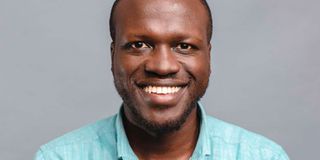T5 interview with filmmaker Sam Soko

What you need to know:
- Historically, African narratives are not told by Africans, neither are they owned by us, and this has to change.
- We have collaborated with filmmakers across the globe, and our work has been screened and received awards in some of the world’s major film festivals.
- This has been possible by connecting talented African upcoming filmmakers with established professionals, as equal collaborators
Sam Soko is a documentary filmmaker based in Nairobi. His first feature documentary, Softie, a story about balancing love of country with family demands, premiered at the 2020 Sundance Film Festival, and won a Special Jury Prize for Editing. Soko has gone on to receive Emmy, Peabody, and PGA nominations for his work. He is also co-founder of LBx Africa, a Kenyan production company that works with local and international filmmakers to bring uniquely African perspectives to global audiences
1. After Softie, what milestone are you looking forward to? Why did you decide to make this documentary?
The film was made to highlight the complicated relationship Kenyans have with the country. We exist in an unhelpful never ending cycle. The power of documentary films is that they offer a space and opportunity for the public to view themselves and reflect. The story of Boniface and Njeri Mwangi brings to the fore a lot of what we have gone through as a people. We are so honoured that they trusted us to tell it. Their story is not only Kenyan, but universal. Now the film has developed a life of its own, and we look forward to having as many Kenyans and Africans experience it. It will be showing on a local news station on December 12.
2. What do you consider your favourite project so far? What was your most memorable one?
My favourite project is my family, and Softie takes second place. It took seven years to put that documentary together, and that required an incredible amount of sacrifice. So much in life passed me by as I worked on the project. In turn, I gained and learned so much about humanity and my country that I believe is helping me with other projects.
3. What need do you feel LBx meets for young filmmakers? Tell us about your journey in film making.
We founded LBx Africa in 2013 intending to impact the world through innovative storytelling. Historically, African narratives are not told by Africans, neither are they owned by us, and this has to change. In the last few years, we have been trying to be part of this change. We have collaborated with filmmakers across the globe, and our work has been screened and received awards in some of the world’s major film festivals.
This has been possible by connecting talented African upcoming filmmakers with established professionals, as equal collaborators. We invest both time and money in projects, even though the latter is harder to come by in Kenya. The local film industry is still growing, there are so many obstacles, but we are determined to overcome them.
4. What exactly do you define as a “unique African perspective?”
What is African is uniquely diverse. It’s not one thing, and the representation of this uniqueness is essential. This expression needs to be backed up with ownership and dignity. We need to be people who benefit from who we are and what we do. For me, that is an African perspective.
5. What project are you currently working on? What do you wish you had known at the beginning of Softie that you didn’t?
I have learnt about the importance of patience and the need to trust your voice in a story. Every film has its time, and you need to have the mental muscle to ensure it reaches its full potential. That said, it is still not easy to implement the lessons. I am now co-directing a film following the largest universal basic income experiment in the world, and it is set in Kenya. It still feels like I’m doing everything for the first time.





